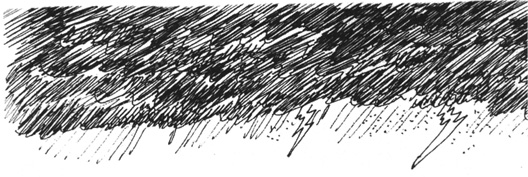Part III
Special Bonus Parable:
The Penguins Ate Your Cheese!
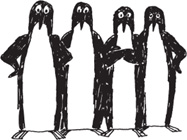
The penguins were in trouble and they knew it.
For many years they had ruled the Land of Penguins
with unquestioned authority.
They had built a great enterprise
that grew and thrived
in the Sea of Organizations.
Penguins were seen as models of success,
and for a long time
their world was orderly,
predictable,
and safe.

But there came a time when things began to change
in the Land of Penguins …
Technology changed –
delivering astounding wonders
of increased productivity
and efficiency.
The Land of Penguins could do more with less
and it took fewer birds to do the work.
Demographic changes brought new birds
into the workplace …
New generations of young birds arrived –
but somehow they weren’t much like their elders.
They had different values,
held different attitudes and beliefs,
and showed little deference to authority.
Flocks of exotic new birds arrived from other lands –
coming in search of a chance
to contribute and compete.
All these new birds brought new energy
and vitality to the Land of Penguins …
but they also shook things up.
Some of the older penguins weren’t so happy –
they felt their talents and skills were no longer valued
and they worried about becoming obsolete.
They felt disrespected by the younger birds,
some of whom ended up being their bosses.
Quite a shock for a generation of penguins
accustomed to being in control!
These waves of technological
and demographic changes
were compounded by powerful winds
of political, economic, and social change
blowing through the Land of Penguins.
The Sea of Organizations grew more turbulent,
and for the first time in many decades
the penguins began to fear for their future.
As they surveyed the worrisome situation.
it seemed as if the winds and waves of change
might swamp their proud land.
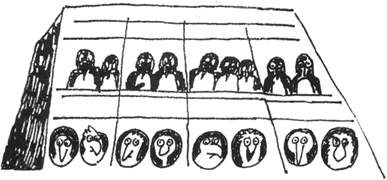
The Very Important Penguins (VIPs)
held meeting after meeting
to try to decide what to do.
Never in their lifetimes
had they experienced such serious threats
to their wellbeing.
While analysts analyzed,
and pundits punted,
those responsible for the bottom line
knew they had to do something.
“Desperate times require desperate measures,”
they said.
“We need to downsize.
If we don’t jettison
some of our worker birds
we won’t be able to stay afloat.”
So they rounded up a percentage of their flock,
herded them onto ice floes,
and cut them loose.
These outsourced birds were set adrift –
left to sink or swim by themselves.
Day after day,
week after week,
month after month,
more and more birds
suffered the same fate.
“It’s not personal,”
their bosses told them,
“It’s just business.”
But for the birds adrift on the ice floes,
it felt very personal.
“What did we do to deserve this?”
they asked one another.
“And where do we go from here?”
They felt betrayed –
after following the rules
for success for so many years –
they suddenly found that
the rules had changed.
“It’s not fair,” they cried.
“I was loyal to the Land of Penguins,
and now to be cut loose so heartlessly.
I’m not young anymore.
How am I supposed to find another job?”
Many of them drifted into Dire Straits.
But it wasn’t just the older birds who were unhappy –
many of the young ones were adrift, too,
and just as frustrated.
“I spent a lot of money getting an education …
and now I get out of school,
only to find there is no room for me
in the Land of Penguins.
I have all these student loans
and I have no idea how I’ll ever repay them.”
The older birds and the younger birds were united
in their frustration and fear,
their discouragement and despair.
They were angry
that they had done all the right things
– but that didn’t seem to count anymore.
It felt like the Game of Life had turned upside down
and the rulebook had been thrown out the window.
All the players had to go back to square one
and reinvent the game from scratch.
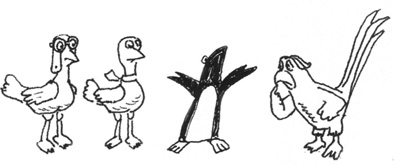
They were confused and angry,
lashing out at the penguins
and accusing them of not caring
about anything except money.
They lashed out at government, too –
saying that government should do more to help –
while others complained
that government had caused the problem.
They even lashed out at each other,
as birds in pain sometimes do.
Their frustration and anger boiled over.
They didn’t know who to blame
so they attacked any convenient target.
It was unfortunate but understandable.
The one thing that all the birds agreed on
was that something had gone terribly wrong
in the Land of Penguins
and they feared it would never be right again.
They felt devastated and wrecked
by the situation in which they found themselves.
They sometimes felt like they would die out there
adrift and alone in Dire Straits.

In the meantime,
things weren’t so hunky-dory
in the Land of Penguins either.
Despite the downsizing
and other measures they had taken,
it was not smooth sailing.
Worker birds were stressed and anxious,
as fewer of them had more and more work to do.
They were grateful to have jobs,
but they had no illusion
that they might not be the next to be cut adrift.
Their pay raises were minimal or non-existent,
and the cost of living outpaced their ability to keep up.
The penguins were even more risk-averse than usual –
huddled in fear and not trying anything new,
for fear of making a fatal mistake.

But amidst the doom and gloom in the Land of Penguins,
a handful of the birds were flourishing –
those that had been thrown a life preserver
by the government
because they were “too big to fail,”
and that life preserver floated them through
the worst of the storm,
enabling them to survive … and now thrive.
The fact that the fattest penguins
were saved while others were left to fend for themselves
was patently unfair –
and everyone knew it.
The growing disparity between the fat penguins
and all the other birds
fueled the growing unrest in their Land.
These were the best of times for a few fat penguins
but the worst of times for everyone else.
Those without work, without money, and without prospects
were afraid and adrift in Dire Straits –
while many of those who still had work and money
were worried that they, too,
could end up the same way.

The Land of Penguins had been through
tough times before –
but nothing this bad since the Great Meltdown.
Most of the birds were too young to remember
how bad things were back then –
only the eldest penguins could recall
how millions of birds lost everything …
and some even lost their lives,
overcome with despair and hopelessness.
No one wanted to see a repeat of the Great Meltdown.
That would be beyond awful.
All the birds in the Land of Penguins
worried and wondered what to do.
The birds adrift in Dire Straits
worried and wondered, too.
They fussed and fretted,
wondering aloud
how much longer they could survive.
They compared notes with one another,
hoping that someone would have a good idea
about how to change their terrible situation.
as the birds settled in
to watch BNN (Bird News Network),
they were startled to see someone they recognized –
it was Perry the Peacock,
who had left the Land of Penguins
some 20 years ago.
“Hey, look at that!” one of the birds exclaimed.
“I remember when the penguins pushed him out.
He was such an interesting, colorful bird,
and he brought a lot of talent to his job.
But penguins being penguins,
some of them just didn’t like his style.
I always wondered what happened to him after he left.”
“Shhhh,” the other birds shushed him.
“If you’ll stop talking so we can hear the news,
maybe you’ll find out!”
The birds leaned forward attentively,
curious to learn more
about this bird from their past.

Anderson Cockatoo was interviewing the Peacock:
”So, tell us about this new book
you just published, Perry.”
Perry nodded and smiled:
“I’d be happy to, Anderson.
The title is Who Cut the Cheese?
What To Do When Change Stinks.”
Anderson looked startled … then began to giggle.
“Haha! That’s a… haha…
uh … oh my …
that’s funny!”
Perry chuckled along with Anderson.
“Some years ago Spencer Pelican wrote a popular book
entitled Who Moved My Cheese?”
Perry explained.
“It was about change,
and how we react to it.
The book was very upbeat and positive.
“But the truth is, change often stinks –
especially when you can’t control anything –
the economy, outsourcing,
the stock market, housing prices,
the value of your retirement account,
the price of college for yourself or
your chicks,
and more.
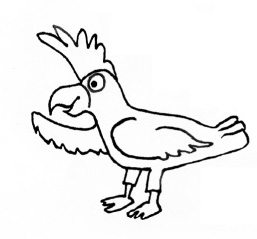
“We’re all buffeted about by the winds of change
and those are foul winds indeed!
So I wrote a book to try to help birds cope
when change stinks.”
“I like the idea,” Anderson Cockatoo nodded.
“It’s definitely something everyone can relate to.”
“Exactly,” Perry the Peacock said.
“Millions of birds in the Land of Penguins are suffering
– not to mention the millions more
whose jobs have been shipped overseas
to other lands.
“Their jobs are gone for good
and the displaced birds
are out there on icebergs and ice floes,
floating aimlessly,
struggling to survive,
with no direction, no hope.
I fear what will happen to them.

“I remember what it was like
when I was shoved out of the Land of Penguins.
I was terrified when the penguins set me adrift,
but I learned how to survive.
Now I want to do something to help the birds
who are in the same position I was in 20 years ago.”
“Well, you seem to be doing great today,”
Anderson said,
“Can you share a few tips with our viewers?”
“Sure,” replied Perry, “I’d be happy to.
“The most important thing I’ve learned
is that everything is an inside job –
success and failure,
happiness and unhappiness,
security and insecurity –
it’s all a function of our attitudes, beliefs,
and the stories we tell ourselves.
“For instance,
if I believe that different equals difficult,
then I’ll react negatively to new ideas
or different ways of doing things.
“On the other hand,
if I believe there are many possible solutions
to most problems,
then I’ll value different perspectives
and welcome new, perhaps unusual, approaches.”
Anderson Cockatoo nodded his feathery white head
in agreement.
“I can see why that’s essential to understand –
because we all have to work with other birds.”
“Yes, we do,” Perry said,
“Business is all about relationships –
relationships between bosses
and the people who work for them;
relationships between businesses
and their customers;
relationships between coworkers;
relationships with vendors and other stakeholders.
“Did you know that 80% of birds who fail on the job
fail because of poor interpersonal skills,
not poor technical skills?
If you can’t work well with others,
you’re going to be in deep guano!
“So polish your interpersonal skills.
Whether you’re still working in the Land of Penguins,
or you flew the coop and you’re out on your own –
getting good at getting alongis essential.”
“I agree,” Anderson Cockatoo said,
“That’s certainly been my experience.
What other advice do you have for our viewers?”
“When I’m coaching my clients I always tell them:
Don’t look for safety – look for opportunity,”
replied Perry.
“There is no place on the map called Safe.
Seeking safety will prevent you
from stretching and growing.
Life is risky;
careers are risky;
running a business is risky.
And no one ever achieved success
or happiness –
by playing it safe.”
“But isn’t it our natural instinct to look for safety?”
Anderson Cockatoo asked.
“It’s just what birds do when we’re scared.”
“Indeed it is,” Perry said.
“But letting fear run your life –
or your business
or your career –
will not get you the results you want.
“The key to surviving and thriving in turbulent times is
feel your fear and get into action anyway.
This is true for both businesses and individuals.”
“Wow!” squawked Anderson Cockatoo,
“I can feel the adrenaline pumping
just thinking about it!
I want to know more …
What else can you tell me?”
“Don’t judge a bird by its feathers,” Perry said.
“Could you elaborate?” the cockatoo asked.
”Tell me what you mean by that.”
“The world is full of many different kinds of birds,”
Perry replied.
“Colorful birds like parrots, peacocks, and macaws;
neutral-hued birds like sparrows, quail, and peahens;
high fliers such as hawks, eagles, and falcons;
earth-bound birds like roadrunners and penguins;
songbirds such as canaries;
quiet birds like doves;
and more.
“We tend to size up other birds
based on their appearance.
But in the process,
we completely miss
their unique talents, skills, and abilities.
In short, we are preoccupied with visible diversity
while overlooking invisible diversity.”
“This is a problem?” the cockatoo asked.
“Yes,” Perry said,
“It’s a problem because we make assumptions
about other birds
based on superficial characteristics,
but miss the opportunity to tap into
their full array of qualities and character.
As a result,
we overlook the creativity of other birds;
we forfeit the chance to learn from them;
we inhibit innovation and new ideas,
engagement, commitment,
group loyalty, and morale.
“Everybody loses when we pigeonhole others
and judge only by appearances.
Individually, we miss out on professional enrichment;
Collectively, we miss out on contributions
to our group’s success.
“For instance,
that Blue-footed Boobie you think is so weird
might just come up with The Next Big Thing.
Those Loons you write off as flakey
might just invent the next Killer App.
That odd bird who annoys you the most
might turn out to be the bird you need the most.”
“That’s so true!” Anderson Cockatoo nodded.
“I’ll bet we’re all guilty
of judging others by their feathers.”
“You bet,” Perry said.
“Well, we’re just about out of time now,”
the cockatoo said as he looked at the clock.
“How about just one more helpful tip
for our viewers?”
“Sure,” Perry said.
“Don’t let what you can’t do
stop you from what you can do.
Stop complaining about things
that are out of your control,
and focus on what you can control:
your mindset and your actions,
how you spend your time,
getting out there and meeting other birds,
forging new relationships,
and continuously learning and trying new things.
This is good advice for both individuals
and organizations:
“Focus on what you can do, not what you can’t.”
“That’s perfect,” Anderson Cockatoo said,
“Thanks so much for sharing
your experience,
strength and hope.
I learned a lot…
and I’m sure our viewers did, too.”
“You’re welcome, Anderson,”
replied Perry the Peacock.
“We have to leave it there for now,”
the handsome white bird said, turning to the camera.
“Tune in again tomorrow night
for the latest in breaking news
from across the Sea of Organizations.
“This is Anderson Cockatoo,
signing off from BNN.
Thanks for watching …
and goodnight.”


…or could it be a new beginning?

